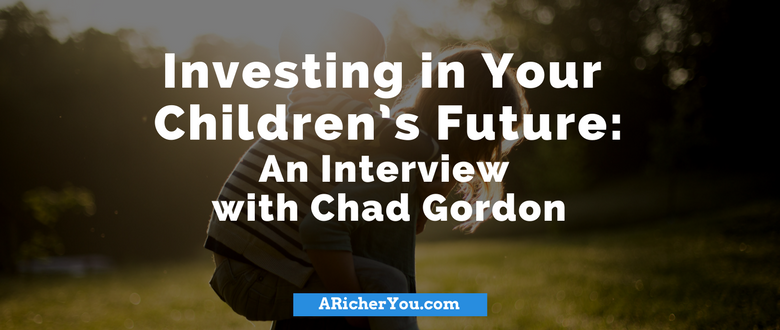Trying to figure out how to best prepare your children for the future can be intimidating. Not only do you want your kids to grow up into responsible, happy adults and good citizens who are contributing to society, but you probably want your children to be financially stable as well. Chad Gordon, author of Wealth by Virtue, is here today to offer some great advice on ways to think ahead for – and with – your children.
What's the biggest money mistake you've seen parents make regarding their kids?
Not creating a safe place to be financially “independent” and letting them make mistakes with your guidance and advice along the way. I think it's very important that kids have their own money (such as allowance) and that they have the freedom to make decisions with it. I think it's also important to not ever lend them money, like ever. If you give them allowance on Fridays, and you are at a store on Thursday and they want an advance on their allowance to buy something, don't give it to them. You should be actively teaching them that if they want something, they need to earn money and then buy it on their own.

I have clients who have children well into adulthood (even middle aged) who are still financially dependent on them. While some amount of parenting is the luck of DNA and chemical balances, this can often reflect some poor parenting choices from when the children were little. When an oak tree is a sapling, a mouse could bend it, but in time it becomes something 50 men couldn't break. It's important to direct your children while they're saplings because in time that window closes and you are less likely to change fixed habits.
What would you recommend parents do to teach their kids about money?
I think the most powerful thing you can teach your children is the power of compounding interest combined with a buy and hold mindset.
When I was a kid, I spent my childhood saving up for my first car – for which I drained my savings account to buy and didn't replenish again until after college. This was a somewhat good experience because it helped me learn long term planning. However, I'm setting my kids' sights on old age.
For example, my kids each saved up around $1,000 by the time they were 10 years old. Early on, they would see something that they wanted to buy with their savings and I would present the choice as:
- Buy something for $1,000 now
- Have around $300,000 when they're 70 years old
They've always chosen option B and now that they are entering high school, they never ask to spend their savings. They see it as a very long term investment … and most importantly, they keep adding money to it with the future in mind.

In addition to this, I would add that it's important to teach your kids to not be afraid of the stock market and investing – to learn to stay calm during market downturns. My book Wealth by Virtue is largely about this very issue and makes the point as clearly as I know how.
Proper emotional investing is going to be mostly about modeling and a little bit about directly educating them. It's like being lost in the woods: if you aren't scared, your kids will feel okay. During down markets, it's important to encourage them to see it as a buying opportunity and not as something to dread or be upset about.
How can parents best prepare their kids for living on their own?
Don't coddle them. Let them “skin their knees” financially. My kids are all over the map in terms of how eager they are to spend money. One of my children literally never spends money, another one is the total opposite. As a parent, you have the temptation and power to prevent your kids from making financial mistakes and I think that this is a bad idea.
About 7 years ago, I noticed one of my kids was a collector. He'd suddenly get into Bakugan and spent all of his money buying all the characters. Then it was Skylanders, then Beyblades, then it was something else. The way I handled it was to gently predict his behavior and to point out the pattern, “It's your money, but how much did those Skylanders cost? Do you ever play with them anymore? Would you pay $X.XX and buy them again today? Okay, it's your choice.”
It's okay to let your child make the “wrong” choice. Obviously, you have to be judicious with your words and it's easy to scar your kids in these situations, but you get the idea. Teach them and let them fail. Eventually, my son broke the hoarding habit and is much better with money now. However, I think it was important he “skin his knees” financially a few times.
It is better to let your kids make a $300 mistake now in the safety of your home than to not learn the lesson and make a $30,000 mistake as an adult.
What money and/or career advice would you give high school seniors?
Try lots of things. The people I know who are really happy in their jobs seem to fit into one of two categories:
- The Calling – There are some people who've known what they want to do in their careers for their whole life, do it, and love it. It's almost like a life calling they've always known.
- The Betrothal – In some societies, marriages are arranged with the idea that you fall in love after you are married. For me, my career was a lot like this. I didn't know what I wanted to do in my career and more or less just fell into it, and fell in love with it after I started doing it. I know many other people who also kind of fell into something they love. It's important to always pay the piper in jobs you don't like so that you can have the opportunity to do something you might like – eventually you will.
Sometimes high school seniors may feel some stress not knowing what they want to do. I would focus on exposing yourself to more things and see what resonates. It's not likely you'll be able to figure out what you love doing until you do it to some extent.

As far as choosing a major, a regret I have is not doing a double or triple major. I was a bit overly pragmatic with college and was just aiming for the finish line. My degree was in business management, which in hindsight was too broad. If I remember right, getting a double major in finance would have been an extra 2 courses. Majoring in something in humanities would have only been 4-6 extra courses. For my career, it hasn't mattered much that I don't have more educational heft, but truth be told, I didn't get much out of college beside the degree.
Are there any financial books you would recommend for high school students to read?
Inevitably I'm being self-promotional, but when I was writing my book (Wealth by Virtue) I was seeking to shoot the ball down the fairway between typical finance for dummies books and highly technical books. I felt most finance books erred on one side or the other. Either they were so basic it was almost insulting to the reader, or they were so technical they were useless to most readers. My book explains our whole financial world in a way that is clear, visual, and engaging. But it's not for wimps – it's meant for those who really want to know and are ready to learn.
Other than mine, I would look at: Stocks for the Long Run by Jeremy Siegel and Nick Murray's Simple Wealth, Inevitable Wealth. Dave Ramsey's books are helpful for budgeting (though I don't totally agree with him on everything).
Do you have any tips for college planning and preparing for the cost of higher education?
Oye, this is a tough one. Last Thursday I was a guest on a radio program in a large college town where I publicly declared I thought the old boarding school college concept was a dying model (think Hogwarts). Of course, this will always exist at some level, but it's progressively less tenable for middle class families.
In terms of preparation, I think parents and kids should do the following:
- Tell their kids college is not something they are putting them through, but helping them through.
- If their kids' high school offers it, they should take as much free college credit as possible (it's common that large high schools will have classes they can take for college credit). They should also take as many AP course as they can.
- They should be open to taking their general education courses (approximately the first two years of a four year degree) at a community college and then transferring to the school that they want to graduate from.
- When in college, if they are a good student, they should overload on courses each semester.
I'm the youngest of three boys. My two older brothers lived at their colleges less than an hour from my parent's house. Since I was still at home through this and modestly perceptive, I could see how stressful this was for my parents to put them through school.
I did research, planned my course, and graduated from CU in three years. The total tab for my bachelor's degree: $6,000 (including books, tuition, etc.) … not per semester or per year, but the whole banana. This wasn't terribly long ago (2002) and while costs are higher now, I think it could still be done today for less than $20,000. In my career, nobody seems to care that some of my college work was done while I was in high school or that the first half of it was done at a community college, or that each semester I would take 21 credits (instead of the normal 12-15 credits) to save money.
I'm pretty negative about student debt and I think people should aim for creativity rather than education leverage. On the other hand, I would say that if a student gets into an incredible school with a recognizable name, they are more likely to get a return on their investment.
How should parents ensure their kids are financially taken care of if something bad were to happen to the parents?
Term life insurance and estate planning (in that order). Get life insurance while you are healthy and young and get lots of it. A $1,000,000 policy doesn't cost that much and I would get it outside of your work benefits. In addition to this, if your employer has life insurance as an option, definitely take it (it is often dirt cheap). My book gives some guidance on how much you need, but it is very important you at least get something.
Estate planning is also important. It can be a way to express your wishes for whom you want to raise your kids if you die. However, there is no certainty that your wishes will be honored. Estate planning is very important for mixed families (anything different than the standard Leave It To Beaver household).
–
Taking steps to mold your children's future financial habits and attitudes is vital for parents who want to raise financially stable adults. Thanks, Chad, for the great advice on ways to model this and mold these behaviors!
If you would like to connect further with Chad, you can find him at WealthByVirtue.com.




